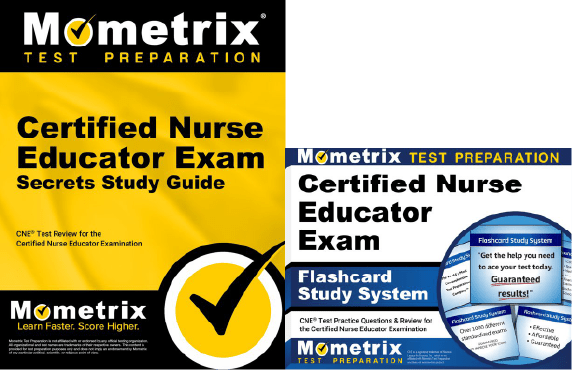If you need help studying for the Certified Nurse Educator (CNE®) exam or just want some more information about what the test is like, you’ve come to the right place.
Click below to take a free CNE practice test!
What’s on the CNE Exam?
How to Register
CNE Exam Scores
Retaking the Exam
Online CNE Prep Course
FAQs
CNE Exam Eligibility
Before you can register to take the CNE exam, you’ll have to meet all of the eligibility requirements from ONE of the options below:
You need documentation of a valid licensure/certificate and a master’s/doctorate degree in nursing that falls under one of these three classifications:
- Includes a major emphasis in nursing education
- Includes a post-master’s certificate in nursing education
- Includes 9+ credit hours of grad-level education courses
Option 2
You need documentation of a valid licensure/certificate, a master’s/doctorate degree in nursing, and at least 2 years of nursing program employment within the last 5 years.
If you meet one of these requirement options, you’re set to begin the registration process!
What’s on the CNE Exam?
First, let’s talk about the questions on the exam. There are 150 multiple-choice questions total, but only 130 of the questions will count toward your score. Why is that?
The 20 unscored questions on the CNE exam are called “pretest” questions. These are added to the exam to determine if they’re good enough questions to add to future versions of the test.
The trick is that you won’t have any way of knowing which questions are scored and which ones are pretest. They will appear just like the scored questions throughout the test.
Each question falls under one of the following three cognitive levels:
- 🧠 Recall: The recall questions test your ability to recall/recognize information.
- 🛠️ Application: The application questions test your ability to apply knowledge to given situations.
- 🔍 Analysis: The analysis questions test your ability to analyze and evaluate solutions.
The time limit for the exam is 3 hours. There aren’t any scheduled breaks, but you’re free to take restroom breaks as needed.
Let’s take a closer look at the different sections of the CNE exam.
1. Facilitate Learning
47 scored questions
- Utilizing active teaching and learning strategies
- Adopting educational theories and evidence-based practices in teaching strategies
- Adapting teaching methods considering learners’ diversity, social determinants, and past experiences
- Integrating technology to enhance the teaching-learning process
- Communicating ideas effectively in various contexts
- Demonstrating reflective thinking practices
- Providing opportunities for learners to develop clinical judgment
- Ensuring a safe and positive learning environment
- Exemplifying attributes that promote learning
- Building and maintaining effective partnerships with healthcare and educational partners
- Applying evidence-based nursing practice concepts in teaching
2. Facilitate Learner Development and Socialization
18 scored questions
- Identifying learners’ needs and attributes based on diversity, social determinants, and past experiences
- Providing resources to support diverse learners
- Helping learners develop and plan to achieve professional goals
- Encouraging learners’ self-reflection, goal setting, and socialization into the nursing role
- Promoting thoughtful and constructive self and peer evaluation among learners
- Supporting the professional development of learners
3. Use Assessment and Evaluation Strategies
18 scored questions
- Designing and applying both formative and summative evaluation strategies
- Using evidence-based assessment and evaluation methods across cognitive, psychomotor, and affective domains
- Assessing the effectiveness of available evaluation methods
- Creating methods for evaluating outcomes
- Implementing evaluation techniques that align with learner and learning outcomes
- Analyzing data from assessments and evaluations
- Using assessment data to improve the teaching-learning process
- Informing learners about evaluation criteria and expectations
- Providing timely, constructive, and thoughtful feedback to learners
4. Participate in Curriculum Design and Evaluation of Program Outcomes
13 scored questions
- Contributing to the development of program standards and policies
- Understanding curriculum development
- Designing curriculum reflecting institutional mission, current trends, community needs, and use of technology
- Leading curriculum and course design efforts
- Developing program evaluations to ensure continuous improvement
- Analyzing and acting on program evaluation results
- Revising curriculum based on outcomes, learner needs, trends, and feedback
- Implementing curricular changes using evidence-based strategies
- Evaluating the effectiveness of the program evaluation plan
5. Function as a Change Agent and Leader
9 scored questions
- Assessing organizational effectiveness to identify necessary changes
- Adapting to changes influenced by external factors
- Creating a culture supportive of change within the institution
- Designing, implementing, and evaluating change strategies
- Modeling diversity, equity, and inclusivity when advocating for change
- Promoting nursing and nursing education leadership
- Encouraging interprofessional education and collaboration
- Advocating for nursing, nursing education, and higher education
- Managing conflicts effectively
6. Pursue Continuous Quality Improvement
9 scored questions
- Participating actively in professional nursing and educational organizations
- Committing to lifelong learning
- Using feedback from evaluations to improve role effectiveness
- Staying current with legal and ethical practices in nursing and education
- Keeping informed about relevant healthcare policies
- Seeking professional development mentors
- Engaging in self-reflection and self-care to enhance teaching practices
7. Engage in Scholarship
7 scored questions
- Promoting a culture of scholarly inquiry
- Exhibiting scholarly qualities
- Planning and conducting scholarly activities
- Sharing the results of scholarly work
8. Function Within the Organizational Environment and Academic Community
9 scored questions
- Evaluating the impact of various factors on nursing and higher education
- Using knowledge of trends and issues to inform decision-making
- Promoting an organizational climate of civility, collegiality, professionalism, and caring
- Supporting diversity, equity, and inclusion initiatives
- Aligning management of issues with the institution’s mission and goals
- Balancing teaching, scholarship, and service demands
- Leading in governance and activities within the nursing program and institution
- Using social media professionally and in line with institutional guidelines
- Contributing to budgetary processes of the program and institution
- Maintaining professional boundaries as an educator
- Mentoring and supporting faculty colleagues
- Helping develop policies and procedures related to learners, faculty, and the educational environment
How to Register
To get started with the registration process, you’ll need to submit an application on the NLN’s website through the Certification Portal. The application will ask you for your contact information, RN license number, and any documentation to prove your eligibility (among other things).
CNE Exam Scores
The CNE exam is scored using a version of the Angoff method.
The Angoff method involves a group of subject-matter experts taking an educated guess at the percentage of candidates who would correctly answer each question on the test. These estimates are then averaged to set the passing score.
The point of this method is to ensure the pass threshold reflects the level of knowledge or skill that’s deemed minimally acceptable for a particular profession or field.
Because there are different versions of the exam given to different test takers, the passing score varies depending on which version you take.
Retaking the Exam
If you didn’t get a passing score on your first try, that’s okay! You can retake the test after a 90-day waiting period.
Keep in mind that you will have to pay the full testing fee every time you retake the test.
Online CNE Prep Course
If you want to be fully prepared, Mometrix offers an online CNE prep course. The course is designed to provide you with any and every resource you might want while studying. The CNE course includes:
The CNE prep course is designed to help any learner get everything they need to prepare for their CNE exam. Click below to check it out!
FAQs
Is the CNE exam hard?
Yes, this is considered to be a very challenging exam to pass, though not impossible with an adequate amount of studying done beforehand.
How many questions are on the CNE exam?
The exam contains 150 questions.
What is the time limit for the CNE exam?
The exam is timed at 3 hours.
What is the passing score for the CNE exam?
The score you need to pass the exam depends on which version you take.
How much does the CNE exam cost?
The exam fee is $525.
CNE is a registered trademark of National League for Nursing, Inc., which is not affiliated with Mometrix Test Preparation and does not endorse this page.



 CNE Online Course
CNE Online Course CNE Study Guide
CNE Study Guide CNE Flashcards
CNE Flashcards

